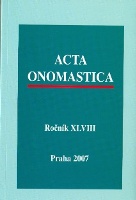Istorijski i onomastički aspekti etnonima Čeh i Bohem u srpskom i hrvatskom jeziku
Historical and Onomastic Aspects of the Ethnonyms Čeh and Bohem in the Serbian and Croatian Language
Author(s): Vidan V. NikolićSubject(s): Language and Literature Studies
Published by: AV ČR - Akademie věd České republiky - Ústav pro jazyk český
Keywords: onomastics; ethnonyms
Summary/Abstract: The paper considers the historical and onomastic aspects of the appearance of (1) the ethnonyms Čeh and Bohem, (2) the appellative čeh, and (3) the possessive adjectives češki, -a, -o and bohemski, -ska, -sko in diachrony and synchrony in South Slavic languages (particularly Serbian and Croatian). The old legends and foreign historical books claim that the origin of the old Serbs and Croats was the state of Bojka (Bohemia), the state named after the Celtic tribe Boji who lived on the territory of the present-day Czech Republic. The latter historical and cultural connections among these Slavic peoples conditioned the appearance of the ethnonyms Bohem and Čeh and the possessive adjectives češki and bohemski in various phonetic and morphological forms in the old writings, books and onymy. The linguistic literature makes a distinction between the ethnonym Čeh and the appellative čeh (“a small, fat man”). The contemporary Serbian and Croatian language show the following situation: (1) only the ethnonym Čeh is used, (2) the use of the appellative čeh had completely faded away (although other foreign ethnonyms have the polysemy), and (3) from the ethnonym Bohem, through French, the appellative boem-bohem has been produced, denoting “an artist who lives in a careless and unconventional way” and also the linguistic terms bohemistika (“the science about the Czech language”) and bohemista (“a Czech language expert”).
Journal: Acta Onomastica
- Issue Year: XLVIII/2007
- Issue No: 48
- Page Range: 114-124
- Page Count: 11
- Language: Croatian

